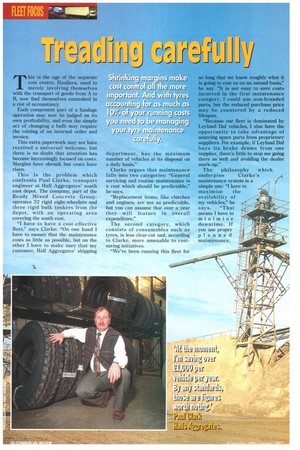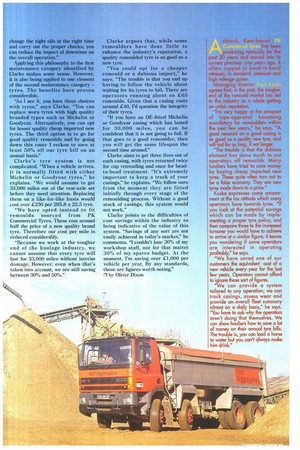T his is the age of the separate cost centre. Hauliers,
Page 40

Page 41

If you've noticed an error in this article please click here to report it so we can fix it.
used to merely involving themselves with the transport of goods from A to B, now find themselves enmeshed in a riot of accountancy.
Each component part of a haulage operation may now be judged on its own profitability, and even the simple act of changing a bulb may require the raising of an internal order and invoice.
This extra paperwork may not have received a universal welcome, but there is no doubt that attention has become increasingly focused on costs. Margins have shrunk but costs have risen.
This is the problem which confronts Paul Clarke, transport engineer at Hall Aggregates' south east depot. The company, part of the Ready Mixed Concrete Group, operates 52 rigid eight-wheelers and three rigid bulk tankers from the depot, with an operating area covering the south east.
"I have to have a cost-effective fleet," says Clarke. "On one hand I have to ensure that the maintenance costs as little as possible, but on the other I have to make sure that my customer, Hall Aggregates' shipping department, has the maximum number of vehicles at its disposal on a daily basis."
Clarke argues that maintenance falls into two categories: "General servicing and routine maintenance is a cost which should be predictable," he says.
"Replacement items, like clutches and engines, are not as predictable, but you can assume that over a year they will feature in overall expenditure."
The second category, which consists of consumables such as tyres, is less clear-cut and, according to Clarke, more amenable to costsaving initiatives.
"We've been running this fleet for so long that we know roughly what it is going to cost us on an annual basis," he say. "It is not easy to save costs incurred in the first maintenance category. I could use non-branded parts, but the reduced purchase price may be countered by a reduced lifespan.
"Because our fleet is dominated by Leyland Daf vehicles, I also have the opportunity to take advantage of sourcing spare parts from proprietary suppliers. For example, if Leyland Daf buys its brake drums from one supplier, there's little to stop me going there as well and avoiding the dealer mark-up."
The philosophy which underpins Clarke's maintenance system is a simple one: "I have maximise the availability of my vehicles," he says. "That means I have to minimise downtime. If you use proper planned maintenance, change the right oils at the right time and carry out the proper checks, you can reduce the impact of downtime on the overall operation."
Applying this philosophy to the first maintenance category identified by Clarke makes some sense. However, it is also being applied to one element of the second maintenance category — tyres. The benefits have proven considerable.
"As I see it, you have three choices with tyres," says Clarke. "You can replace worn tyres with high quality branded types such as Michelin or Goodyear. Alternatively, you can opt for lesser quality cheap imported new tyres. The third option is to go for good quality remoulds and by going down this route I reckon to save at least 50% off our tyre bill on an annual basis."
Clarke's tyre system is not complicated. "When a vehicle arrives, it is normally fitted with either Michelin or Goodyear tyres," he explains. "We would assume to get 33,000 miles out of the rear-axle set before they need attention. Replacing them on a like-for-like basis would cost over £230 per 295.8 x 22.5 tyre.
"We have opted instead to fit remoulds sourced from PK Commercial Tyres. These cost around half the price of a new quality brand tyre. Therefore our cost per mile is reduced considerably.
"Because we work at the tougher end of the haulage industry, we cannot assume that every tyre will last for 33,000 miles without interim damage. However, even when that's taken into account, we are still saving between 30% and 50%." Clarke argues that, while some remoulders have done little to enhance the industry's reputation, a quality remoulded tyre is as good as a new tyre.
"You could opt for a cheaper remould or a dubious import," he says. "The trouble is that you end up having to follow the vehicle about waiting for its tyres to fail. There are operators running about on £65 remoulds. Given that a casing costs around £40, I'd question the integrity of their tyres.
"If you have an 0E-fitted Michelin or Goodyear casing which has lasted for 30,000 miles, you can be confident that it is not going to fail. If that goes to a good remoulder, then you will get the same lifespan the second time around."
Clarke aims to get three lives out of each casing, with tyres returned twice for cap retreading and once for beadto-bead treatment. "It's extremely important to keep a track of your casings," he explains. "We follow ours from the moment they are fitted initially through every stage of the remoulding process. Without a good stock of casings, this system would not work."
Clarke points to the difficulties of cost savings within the industry as being indicative of the value of this system. "Savings of any sort are not easily achieved in today's market," he comments. "I couldn't lose 30% of my workshop staff, nor for that matter 30% of my spares budget. At the moment, I'm saving over £1,000 per vehicle per year. By any standards, those are figures worth noting." n by Oliver Dixon
shford, Kent-based has been
producing remoulds for the past 20 years and moved into its current premises nine years ago. It offers capped or bead-to-bead retreads, in standard, premium and high mileage guises.
Managing director agrees that, in the past, the rougher end of the remould market has led to the industry as a whole getting an unfair reputation. "I'm very happy at the prospect of type-approval becoming mandatory for remoulders within the next Few years," he says. "A good remould on a good casing is as good as a quality new tyre, and will last for as long, if not longer.
"The trouble is that the dubious element has done much to put operators off remoulds. Many hauliers have tried to save money by buying cheap imported new tyres. These quite often turn out to be a false economy. They are new tyres made down to a price." Kuske expresses some amazement at the lax attitude which many operators have towards lyres. if you look at the potential savings which can be made by implementing a proper tyre policy, and then compare those to the increased turnover you would have to achieve to arrive at a similar figure, it leaves you wondering if some operators are interested in operating profitably," he says. "We have saved one of our customers the equivalent cost of a new vehicle every year for the last few years. Operators cannot afford to ignore those sort of figures. "We can provide a system tailored to any operation; we can track casings, assess wear and provide an overall fleet summary almost on a daily basis," he says. "You have to ask why the operators aren't doing that themselves. We can show hauliers how to save a lot of money on their annual lyre bills. The trouble is, you can lead a horse to water but you can't always make him drink."








































































































































